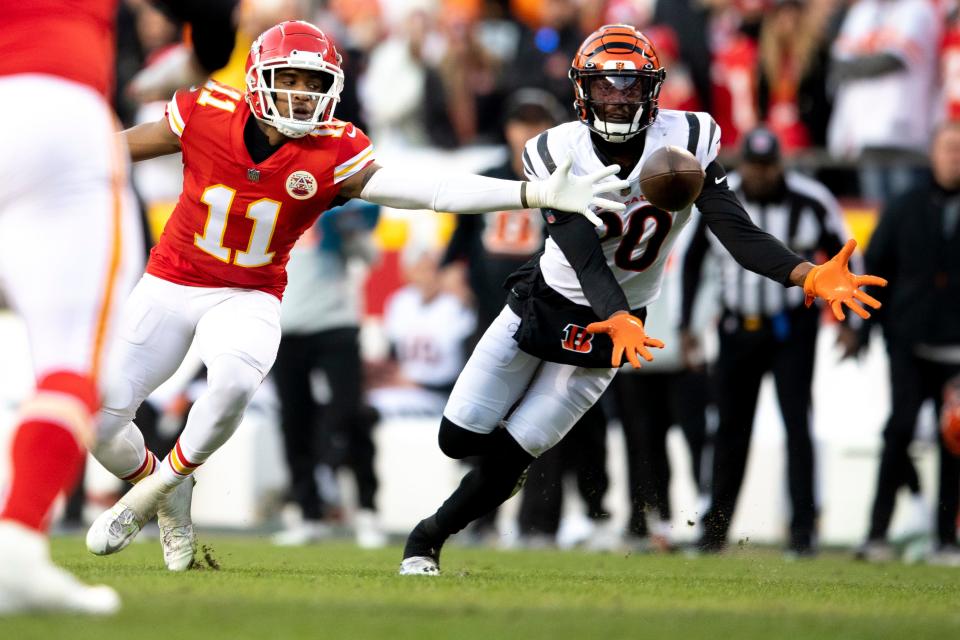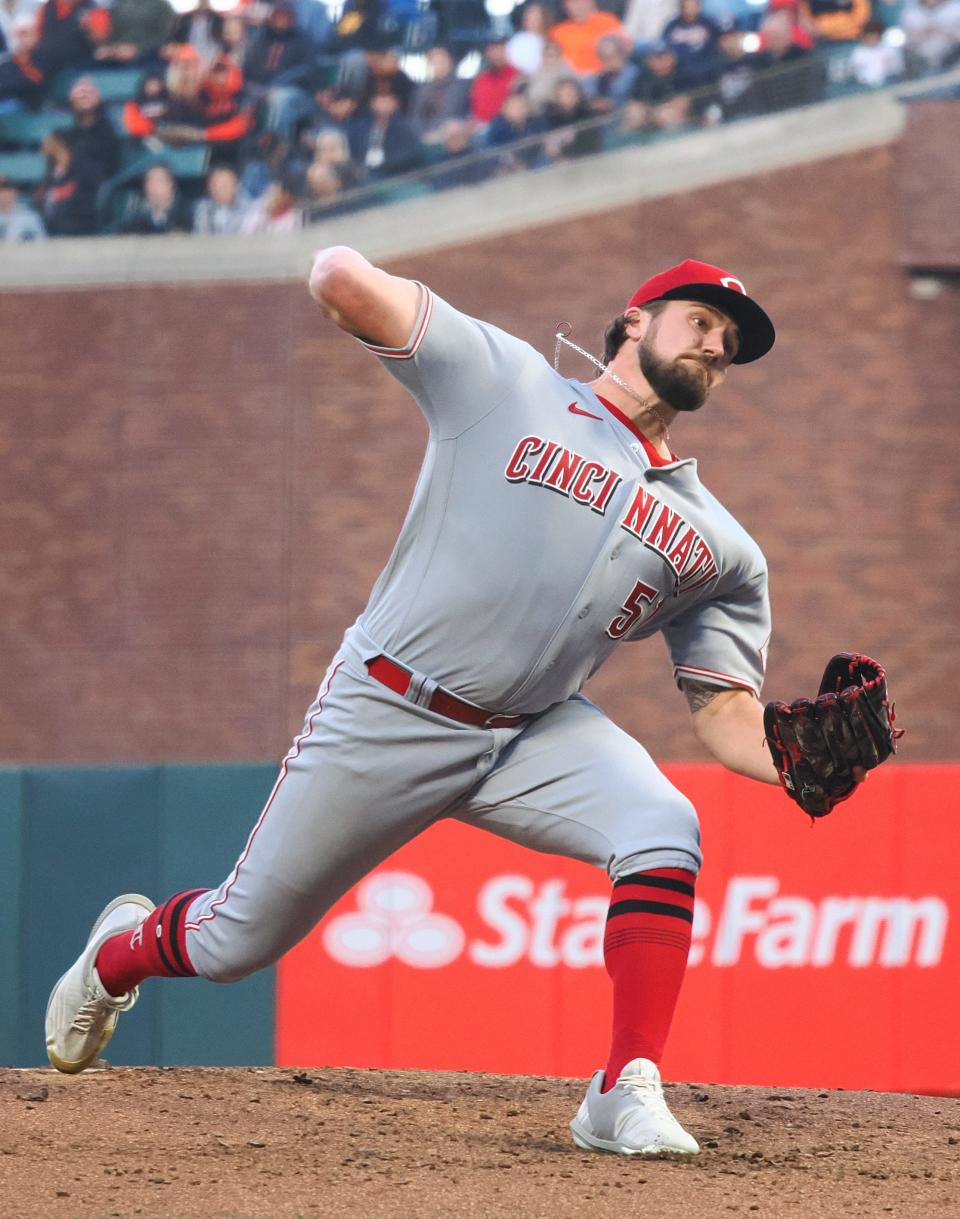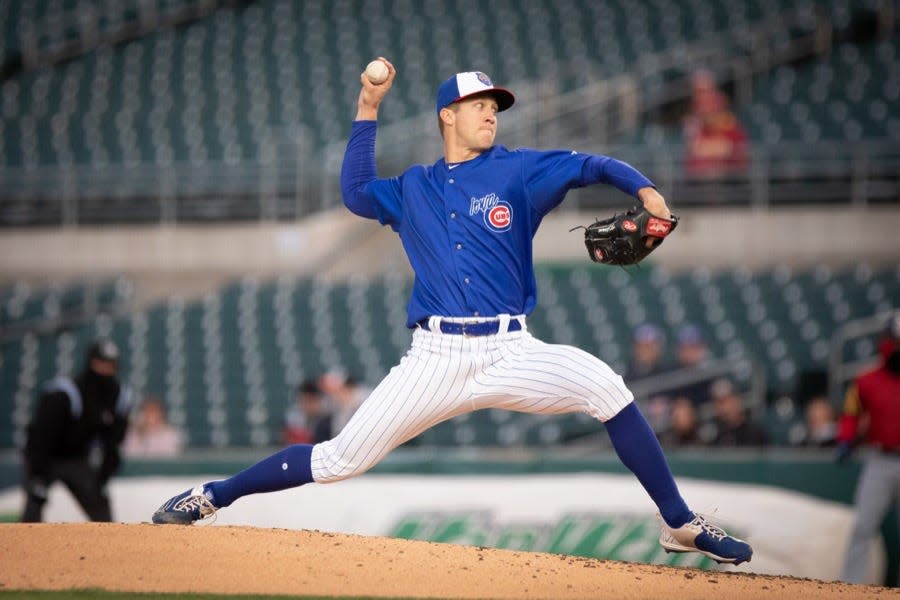The biggest flaw on the Cincinnati Reds depth chart and how they're fixing it
Editor's note: Oops, we accidentally sent you last week's newsletter again this morning. Here's today's newsletter. Enjoy and thank you for subscribing.
I’ve read everything Paul Daugherty’s written for as long as I can remember. Doc’s the only writer who I can say that about. Once, I was reading The Morning Line on my iPad during science class. Doc was making a smart point about the Reds firing Dusty Baker, and I was locked in on what I was reading.
My science teacher could tell I was distracted and, while explaining photosynthesis, lobbed a white board marker my way. It was a great throw. The marker hit my iPad and made me remember that I was in science class. I finished reading TML later in the day.
I’ll miss working with Doc and congratulate him on his retirement.
Leading off
The highlights of the Reds season have been when rookie starting pitchers like Hunter Greene and Graham Ashcraft have shown the light to come at the end of the rebuilding tunnel.
When Greene won NL Player of the Week earlier this month, it was another sign of how the Reds’ outlook could be trending in the right direction. When Ashcraft completed eight outstanding innings on Friday in a win over the Giants, it was another example of what the Reds are building around.
But when the Reds scored seven runs in the third inning of Sunday’s win over the Giants, there were virtually no long-term implications. None of the RBI came from hitters who are expected to be starters on the Reds’ next playoff team.

Even when Brandon Drury, Tommy Pham, Joey Votto, Matt Reynolds, Albert Almora Jr. and Aramis Garcia drove in runs, it wasn’t a shining light to the Reds’ future.
The Reds’ big league roster in 2022 is filled with position players with no long-term commitment from the Reds. The Reds have too many hitters whose 2022 season is basically an audition for the other 29 teams.
The only position players on the Reds’ active roster who will likely be starters on the next Reds playoff team are Jonathan India and Tyler Stephenson. And the reinforcements still aren’t close in the farm system.
The Reds’ Triple-A roster isn’t a reassuring sign about the future. Jose Barrero is the only position player on the Louisville Bats that the Reds view as a likely long-term starter.
The Reds’ front office has already made changes to prevent another drought of position player prospects. Over the last three years, Reds GM Nick Krall has restructured the Reds’ front office, aligned the Reds’ scouting vision with their player development vision and sought out more athletic, versatile position players with more well-rounded approaches at the plate.

For a long time, the Reds weren’t getting many MLB contributors out of international scouting. The Reds have made major changes in that area and turned the international market into a priority for roster building.
This different approach has the Reds farm system trending in the right direction. Since these changes started to take place around 2019, the Reds are seeing the payoff in High-A Dayton and in Double-A Chattanooga with impressive prospects like Matt McLain, Michael Siani, Elly De La Cruz, Allan Cerda, Jose Torres, Jay Allen, Rece Hinds, Austin Hendrick and Mat Nelson.

But when you make massive changes to the way you structure your farm system, it takes time for those prospects to trickle up to MLB. When the Reds look to make moves at the trade deadline, they’d benefit from acquiring Double-A and Triple-A hitters to fill these voids in their farm system.
If the Reds don’t trade players like Luis Castillo, Tyler Mahle, Pham and Drury for high-level position player prospects who could be ready to play in MLB next season, then the Reds will enter the 2023 season with next year’s versions of Drury, Reynolds, Donovan Solano, Almora Jr. and Pham in their starting lineup.
The other sideline
Last week, I wrote a feature about Bengals cornerback Eli Apple. What stood out to me the most was this quote by Bengals cornerback Chidobe Awuzie.
“Last season, (Apple) made the most of himself. Besides what anybody said and however anybody had critiqued him, he was undoubtedly himself. His presence was always felt. On a football team, any player can get lost in the mix and not let their personality shine. Apple does such a good job letting his personality shine, and in turn, his play shines.”
It’s become a cliche at this point to praise the Bengals’ culture, but there’s no better example than Apple about the impact of a locker room environment on an individual player.

Apple’s former teams gave up on him, and some of his former teammates made fun of him on social media after the Super Bowl. Still, the Bengals’ cornerbacks were texting Apple all offseason to encourage him to re-sign with the team.
Apple has been a polarizing player throughout his career, but the Bengals have brought out the positive. “You can just tell he loves the game of football,” Mike Hilton said. “He’s someone we count on.”
Quote of the day
David Bell on Tommy Pham: “I don’t know what people miss. I don’t know what other people know about Tommy. I know what I know about him and it’s pretty straightforward. It’s very real. It’s very honest. It’s authentic. It’s who he is. He’s a good person. He cares a lot. On the field, he plays to win the game, period. And he plays hard, really, really hard.”
Question of the day

Over the next five years, will the Reds’ ability to develop pitchers be more important than the Cubs’ ability to spend excessively in free agency?
The Cubs have a very similar problem to the Reds’ issue –– lack of position players in MLB that they’re building around. Nico Hoerner, Seiya Suzuki and Christopher Morel are the Cubs’ young core. The Reds have stronger young talent in MLB and a more highly-regarded farm system.
The Cubs, obviously, can spend more in free agency than Cincinnati. The Reds’ advantage is their success rate in developing pitchers.
The Cubs don’t have a Hunter Greene, a Graham Ashcraft, a Nick Lodolo or a Brandon Williamson. They’ve struggled developing pitchers since Kyle Hendricks made his debut in 2014. Their rotation entering the season was free agent signings Marcus Stroman, Wade Miley and Drew Smyly, an aging Hendricks and a former middling prospect in Justin Steele. When they made the playoffs in 2020, Hendricks was the only homegrown starter.
Caleb Kilian, who recently made his MLB debut and is currently in Triple-A, is the Cubs’ only standout pitching prospect. Kilian was an eighth round pick in 2019 by the Giants and was the centerpiece of the Kris Bryant trade. Kilian’s strength is his command, but he was recently optioned to Triple-A because he struggled throwing strikes consistently.

The Cubs’ young pitchers aren’t anywhere close to what the Reds have. Even if you can spend more in free agency, you still need to be able to develop young pitching to consistently compete.
More to read
Could the Reds go to a six-man rotation?
The pressure is on the Reds starting pitchers
This article originally appeared on Cincinnati Enquirer: The biggest flaw on the Cincinnati Reds depth chart, how they fix it

 money
money 